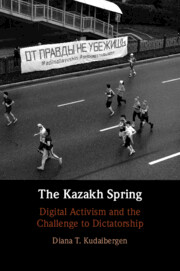Book contents
- The Kazakh Spring
- The Kazakh Spring
- Copyright page
- Dedication
- Contents
- Figures
- Tables
- Acknowledgements
- Introduction
- 1 What Is the Kazakh Spring?
- 2 Who Are Oyan, Qazaqstan?
- 3 Deconstructing Vlastʼ
- 4 Performing the State, Performing the Protest
- 5 Generation Q and Decolonizing Alash
- 6 The Public Square and the Body under Authoritarian Pressures
- 7 Queering the Public Sphere
- 8 Making Sense of the Bloody January 2022 Mass Protests
- Conclusions
- References
- Index
3 - Deconstructing Vlastʼ
Published online by Cambridge University Press: 16 May 2024
- The Kazakh Spring
- The Kazakh Spring
- Copyright page
- Dedication
- Contents
- Figures
- Tables
- Acknowledgements
- Introduction
- 1 What Is the Kazakh Spring?
- 2 Who Are Oyan, Qazaqstan?
- 3 Deconstructing Vlastʼ
- 4 Performing the State, Performing the Protest
- 5 Generation Q and Decolonizing Alash
- 6 The Public Square and the Body under Authoritarian Pressures
- 7 Queering the Public Sphere
- 8 Making Sense of the Bloody January 2022 Mass Protests
- Conclusions
- References
- Index
Summary
In this chapter, I dwell on regime–society – rather than classical state–society – relations and argue that the state and political power (vlast’ in Russian) is represented for many citizens by the authoritarian regime and its main dictator. I contend that to analyse these relations, we need to study how they are understood and practised in a given case. Thus, the chapter represents an in–depth analysis of activists’ and citizens’ perceptions of their positions vis–à–vis the regime, the lack of the rule of law, and conditions of socio–political insecurity. In these conditions, the ‘stability’ of everyday life and the established system of values – economic capital, incentives to normalize corruption, and so on – represent a crucial backbone to regime stability, where coercion is not the prime mechanism available to the elites. The logic of Kazakh Spring and Oyan, Qazaqstan activists is to fight against institutionalized authoritarianism and this system of authoritarian values and perceptions of ‘power’ as something embodied in the figures of autocrats. This shift is a new feature of the protest waves of the Kazakh Spring, and it potentially makes it more viable and sustained.
Information
- Type
- Chapter
- Information
- The Kazakh SpringDigital Activism and the Challenge to Dictatorship, pp. 98 - 133Publisher: Cambridge University PressPrint publication year: 2024
